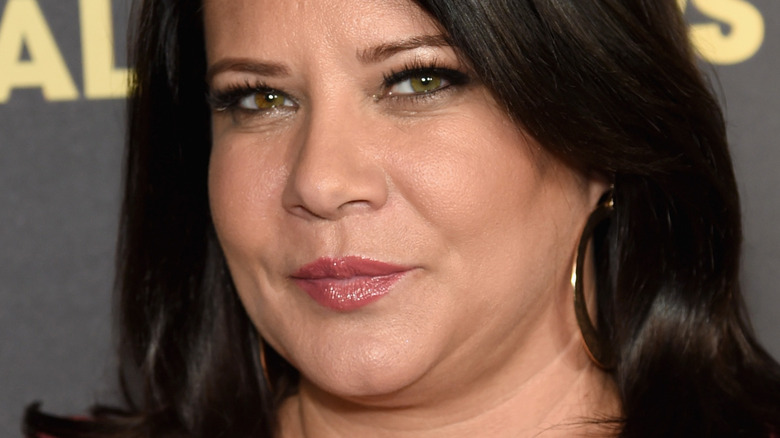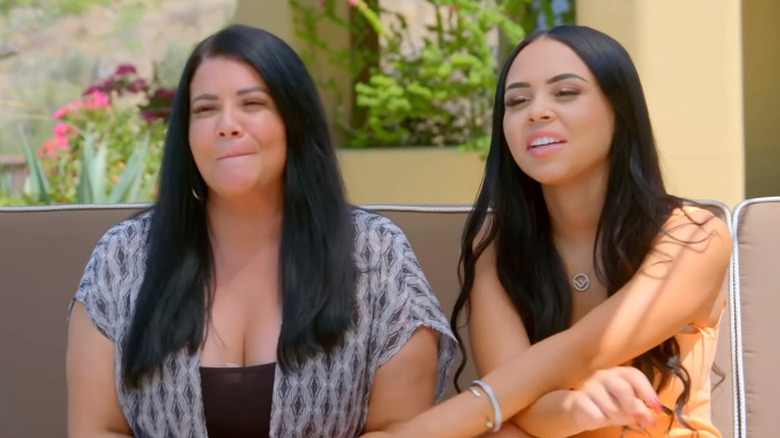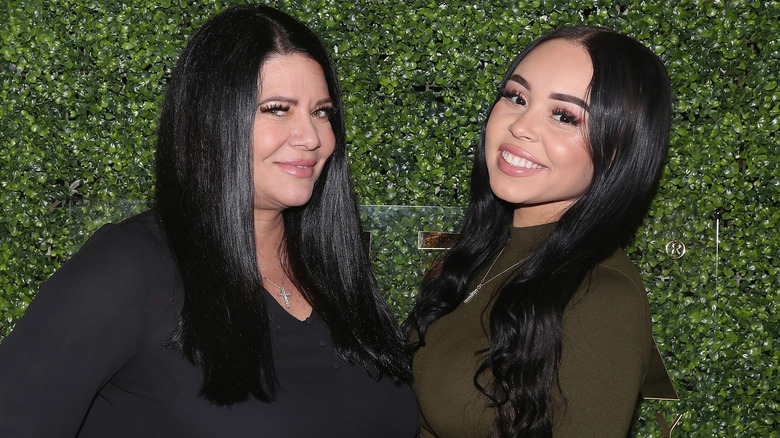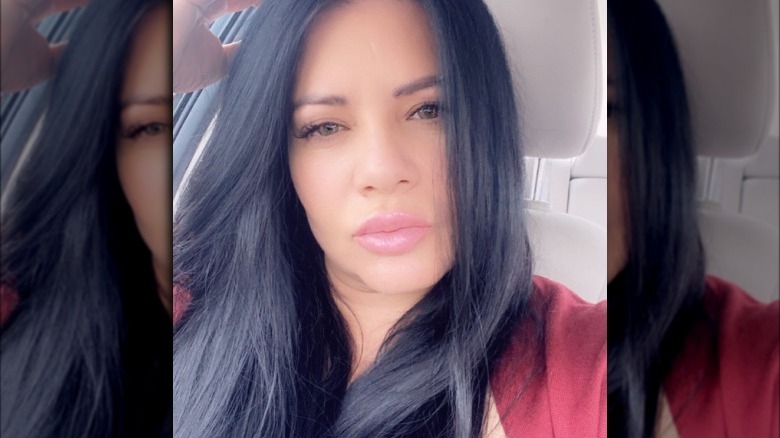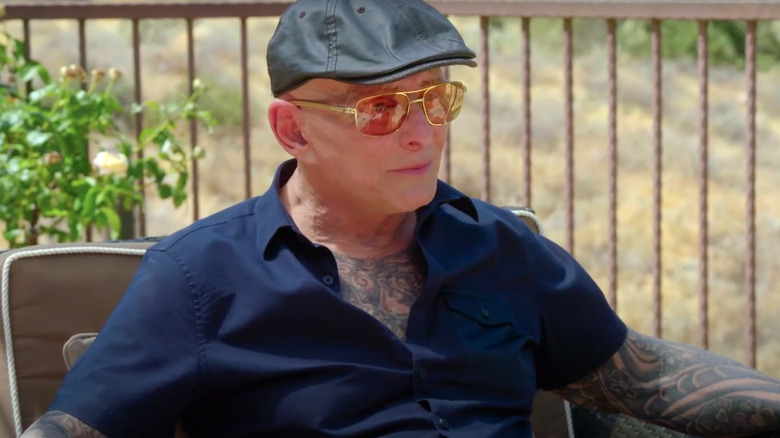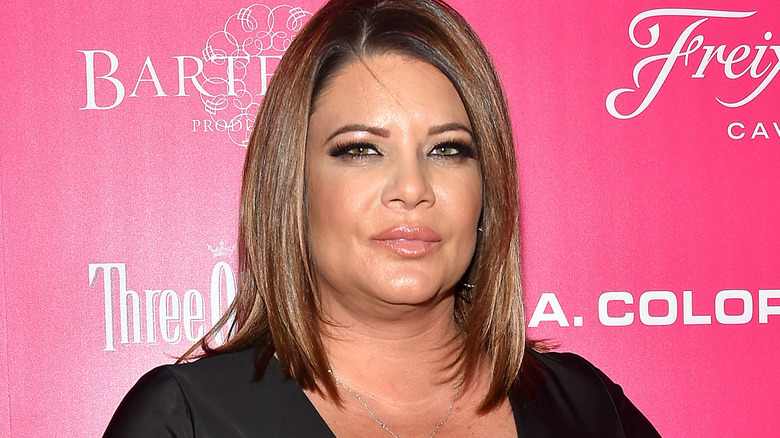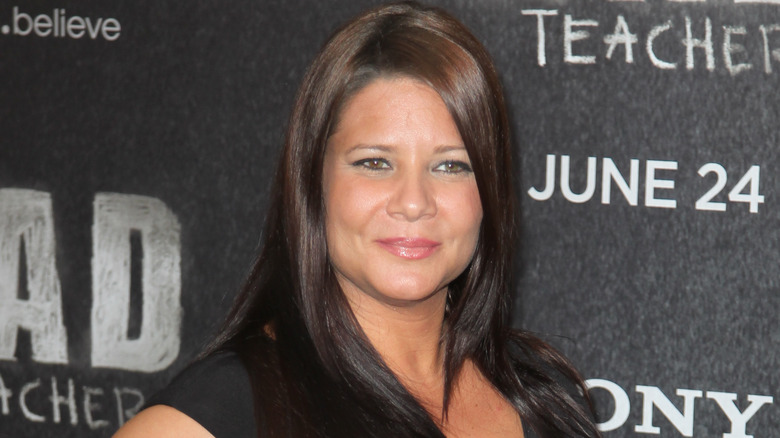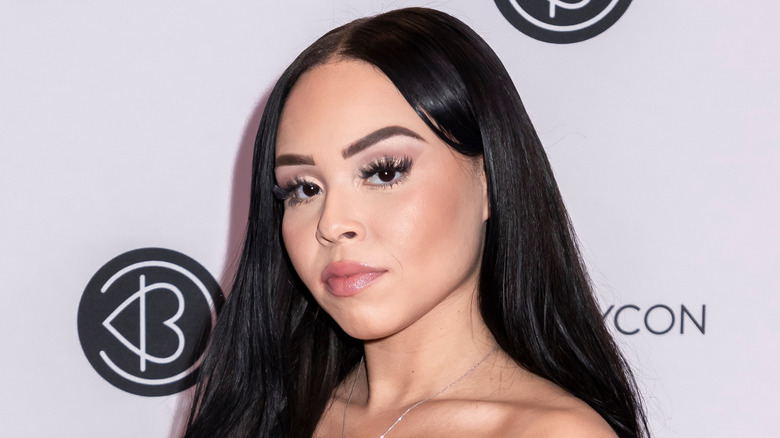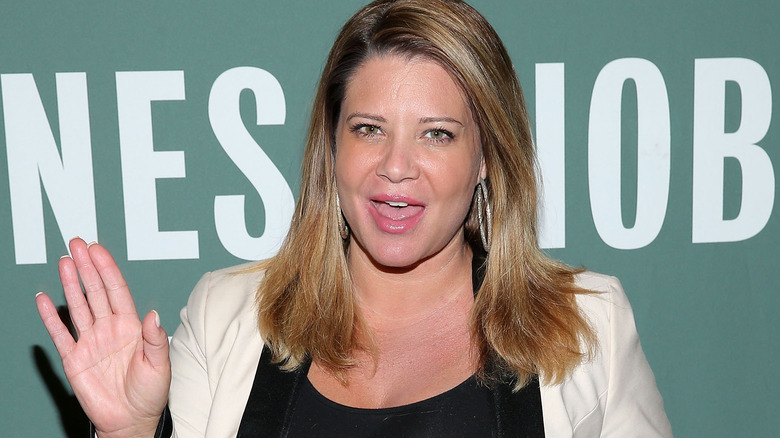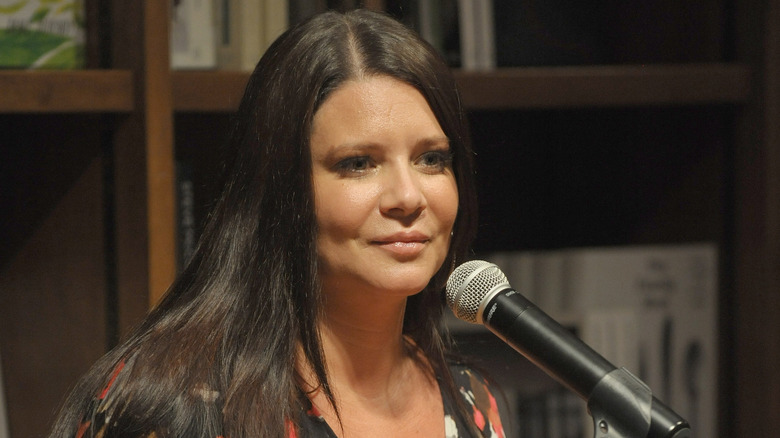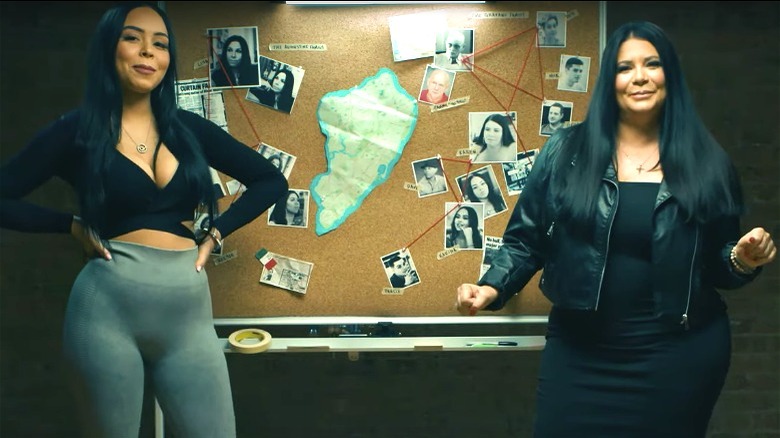Karen Gravano And Karina Seabrook Spill The Details On Mafia Ties - Exclusive Interview
Karen Gravano has been on the reality TV circuit for a long time — but she's been associated with the mob for even longer. If the name sounds familiar, that's because her father, Salvatore "Sammy the Bull" Gravano, made headlines as the infamous underboss of the Gambino crime family. Today, he's served his time (he famously became an informant in the early '90s, helping put John Gotti behind bars for life) and launched a new career as a podcast host, but the stigma of his past still haunts his family's name.
Rather than shy away from her notorious upbringing, Karen leaned into it, building a cottage industry of media aimed to dispel the misconceptions of mob life. First came VH1's "Mob Wives," a glimpse into Karen's tight-knit Staten Island community. Then came her memoir, "Mob Daughter: The Mafia, Sammy 'The Bull' Gravano, and Me!" and a brief stint on "Marriage Boot Camp: Reality Stars." Today, Karen's not only a reality star but the executive producer of her own MTV series, "Families of the Mafia," which she says is part reality show and part true crime documentary.
In this exclusive interview, Nicki Swift sits down with Karen and her daughter, Karina Seabrook, to set the record straight on what it's really like growing up in the mob.
Karen Gravano and Karina Seabrook on growing up with Sammy 'the Bull' Gravano
I first wanted to ask you guys what it was like growing up with a father and grandfather in the mob. I know it's a different experience for you [Karen] than it is for your daughter [Karina].
Karen Gravano: Yes, Karina and I grew up having two different experiences. I grew up definitely more connected to that lifestyle, in the mix of it all. And I seen the glitz, the glamour, the heyday of the mob, and I want to say the perks of that lifestyle. Karina grew up differently with pretty much having to see the repercussions.
Karina Seabrook: The earliest memory I remember of my grandfather, [he] was behind bars. So I grew up with the repercussions and the negatives of that lifestyle and where it got my family. So it was a big difference in what my mom lived. She had all the good parties and the good gifts. I was dealing with the negatives.
KG: And that's why this show kind of takes it all full circle. My father plays a much bigger role in this series to where you hear a lot of his story, taking it all the way to Karina's story and how everything just went from point A to point C and here we are now just navigating through life.
According to Karen Gravano, mob life is surprisingly normal
Did people treat you differently in school and growing up knowing that your family was part of this crime ring?
KG: Yes. I grew up on Staten Island, and a lot of people are connected to that lifestyle in one way or another and know someone. So it wasn't so far-fetched, but definitely in the heyday, gangsters were looked at as movie stars. So there was a level of respect, but also I still can say I felt very normal because a lot of my friends' fathers, grandfathers, uncles, were involved in that lifestyle. So even though we were different, it was like my community was, we were all the same.
And Karina, was it any different for you or not really?
KS: I kind of grew up more on the West Coast, so I was kind of sheltered and shielded from that lifestyle, and it's very different on the West Coast, it's not so prominent ... and when I came back to New York, it was very much in my face, but at that point I was older and I kind of understood that this is my family, and I had to hold my shoulders high and just understand where I came from and know how to move in any situation.
The Gravanos' witness protection wasn't what you think
Karen, your father went into witness protection and was in it for a while. What was that like for your whole family? I know you left and went to Arizona. Was that around the same time?
KG: There's a big misconception about the time that my father spent in the witness protection program. He never wanted to go in, but the government, they actually required him when he left prison to sign up, and he stayed in for six months and then signed himself out. There were too many restrictions, rules, regulations, and he just definitely wasn't a person that liked to follow the rules. So my family never went into the witness protection program. We moved to Arizona just because my mother wanted to get away. She wanted a fresh start. So she had moved to Arizona, and then eventually when my father was released from prison, like I said, he went into the program for six months and signed himself out, and we were just living openly in Arizona.
Do you have concerns now about the sort of thing that the government forced you into witness protection for or not?
KG: No. I understand why, and that was my father. They didn't force us into anything. I can't say that. That was his — my father was a very strong-minded person, and he's going to make the decisions he wanted to. So I don't know if they forced him per se, but they just wanted to be able to see if he can go on. He was very recognizable. My father is probably one of the most famous people in organized crime, so I think they thought it would be best to come out and try it. He did, and it didn't work for him, and he went on about his life.
Why Sammy the Bull grabbed reality TV by the horns
He's quite the social media personality now.
KG: He's very interesting.
Yeah. He's so interesting online. How did you convince him to go on reality TV?
KG: My father's story, I always felt that it was really big and he needed to tell it from his voice, his perspective, and the things that he's seen with being inside that lifestyle. He does his podcast. He doesn't pull any punches. "Our Thing," which is the name of his podcast, is something that I encouraged him to do. Reality TV was different because I don't think that he ever felt like he was a reality TV person. Although he knew me being an executive producer on the show and where we took it in this direction of being more true crime docuseries, he felt that it was something that he wanted to do to support me, my daughter, and be able to set the record straight.
Were there any concerns that you guys had about airing your family drama in front of everyone?
KS: I feel like our family's coming from the last name. It's already out there, so there's already stories, and misconceptions, and shows, and everything that's going to be spoken about regardless. So if we could come together as a family and film together and show the realness –
KG: And set the record straight.
KS: — the life that we really do, and set the record straight, then it's just a blessing to be able to share with everyone.
Karen Gravano reveals the biggest misconception about mob life
I know you have been working really hard to show people all the misconceptions of mob life. With all the TV and stuff about it online, what do you think are the biggest misconceptions?
KG: I think speaking is just that these men aren't human, right? So it's like they live a certain kind of lifestyle, but reality is, they have families, and they have everyday struggles. And I think I can speak on my family. We have just regular life. Yes there's glitz, there's glamour, there's all that stuff that was involved in my father's lifestyle, but reality is he kept me grounded. I had to go to work every day. He tried to steer me to become a regular person, and I think that people just think that because these men choose a life of crime that that's what they do. And I don't think you realize how much they try to push the family and steer the family in a different direction.
The big difference between Mob Wives and Families of the Mafia
Karen, you started with "Mob Wives," which I was obsessed with.
KG: A lot of people were.
How was filming "Mob Wives" different from "Families of the Mafia"? I know now you're an executive producer.
KG: I like to say that "Families of the Mafia" is "Mob Wives" on steroids, where you're looking at the whole family as a whole. "Mob Wives," it was a stepping stone. It was an experience. It was an ensemble cast where you dealt with a lot of the relationships between the women, and sometimes it just went into a direction of arguing or fighting, and it just got blown out of proportion where this show is family, right? So no matter what, even if I have a fight with my daughter, I can't punch her in the face and curse her out and then not let her back in the house. So these are real life struggles, and it's navigating through the experiences that we have had in our lives and just forging forward and living life every day.
Karina Seabrook on her relationship with her father
I wanted to talk about some of that with Karina. I know at the end of last season, you had this conversation with your father that was just so upsetting. Have you managed to repair your relationship at all?
KS: My whole life growing up, it's always been me and my mom, and my mom actually always made it super important for me to go visit my father every weekend when he was away, but having him not there affected our relationship a lot. And now that he's out and I actually have two little sisters, we are finally able to repair that relationship, but there will always be something missing, and that does hurt me. I'm older now, but I tried to be closer with him and work it out the best that I could, but there will always be a little bit missing, but that's my father and I love him forever, but I try every day to become closer with him.
Karen Gravano on balancing her off-screen and on-screen roles during Season 2 of Families of the Mafia
Karen, what was it like balancing being in front of the camera and behind the camera?
KG: It's always a crazy balance because I really see the vision of this show and I'm very grateful for MTV and Viacom for letting us take it in the direction, and it's, in my opinion, nothing that you've really seen on TV. It's kind of reality TV meets docuseries — I mean documentary — and it's like digging deep into the history of the family.
And I think my biggest struggle was I always just want to protect everyone in my family. So knowing that we want to tell this story in the best way possible being a producer, it's also, I'm very vulnerable and protective of my family when they're opening up, but everyone really just got in there and did what they had to do. And dealing with my daughter, I'm like, "You know you have to come home and film right now," and she thinks she can make her own schedule. That's some of our little go back and forth, but overall it was pretty easy.
Can you tell me anything about Season 2?
KG: Season 2, I think, covers so many different topics. It has the whole foundation of the mob and the lifestyle that we grew up in, but yet it deals with prison reform and relationships. There's a castmate that is dealing with health issues; Karina changing her path and trying to come out of the shadows of her family; There's the O'Tooles, who are dealing with the loss of their father. Honestly, we were like, "How could we possibly have this much going on in one show?" We added two new families, the Nayfelds and the Cutolos, who have huge stories. There's so much history. So to actually bring it all together by the way we shot it, as far as bringing you all the history and all the stuff that the families have been through to current day, is really amazing to watch.
Karen Gravano on prison reform: 'Everybody deserves a second chance'
You have been working on prison reform a little bit and speaking out about it. Can you talk about your work in that realm?
KG: Yeah, because of everything that I've been through with my family history, this has always been something near and dear to my heart. I do have a loved one in prison serving a life sentence. And I, in the beginning, really didn't feel like my voice would be heard, because I have had so much interaction with the law that I finally started digging deep into the case and understanding that so many people have unjust sentences. They went away for long periods of time in the '80s and '90s. They were giving life sentences out as if it was candy.
And now these men are trapped behind walls with no voice. So not only for [my boyfriend] Xavier, who is my loved one, there are so many other people who have loved ones that are just stuck. And to be able to shed light on some of the situations, like I said, in the current court system, there are so many laws that are changing. And a lot of people who were sentenced to life have been able to come home. So to keep lending my voice or other people's voice to be able to share these stories, and hopefully the laws will continue to change because I believe people are human beings. They make mistakes and everybody deserves a second chance.
Karina, what have you been doing in your life to make a name for yourself outside the family?
KS: I feel like watching my grandmother and my mom hold down the family when times were hard, it inspired me to be such a powerful, working, independent woman. And I want to continue to inspire young women who go through hard times and could potentially take the wrong path, but instead turn that into a positive path and break the chain of history and in their families. And I do a lot to change that. I am in finance. I took it in my own path as to building my own brand. So I show a lot of that, but more importantly, I want to continue to inspire other young women and come together and just boss up.
Don't judge a reality show by its cover
I have one last question for you. With portrayals of Italian Americans on TV and things like "Jersey Shore," I know that angered the Mayor of Seaside Heights. I know New York City Mayor Bill DeBlasio spoke out against "Made In Staten Island," the reality show you previously starred on, Karina. What do you think about the portrayal of our kind of people on television?
KS: I think we're showing our stories and our life as real and raw as we could without sugarcoating it, and we're not speaking for all Italian Americans. We're speaking as ourselves and hoping some people can relate to all of our stories, and the other families as well, but some people may not be able to relate. But at the end of the day, I believe that we're just spreading our story and sharing that with the world.
KG: And it's don't judge a book by its cover. So many people judged before it even came out. They were saying we're glorifying things, and I'd really just consider it highlighting situations. And when you really watch the show, you'll see because we dig down deep into that. So everybody's always going to judge you, and I think when people do, it just means that you're making noise. So keep pushing forward.
I agree with you. So, is there anything else that you guys have in the pipeline?
KS: I think as a family we all have a lot going on, which is going to be amazing, but every day is a step forward.
KG: Yes. Karina is working on her brand [Kglow]. She has a beauty brand coming out and her finance stuff. So everybody's always working on something and we kind of touch on a lot of that within the show.

